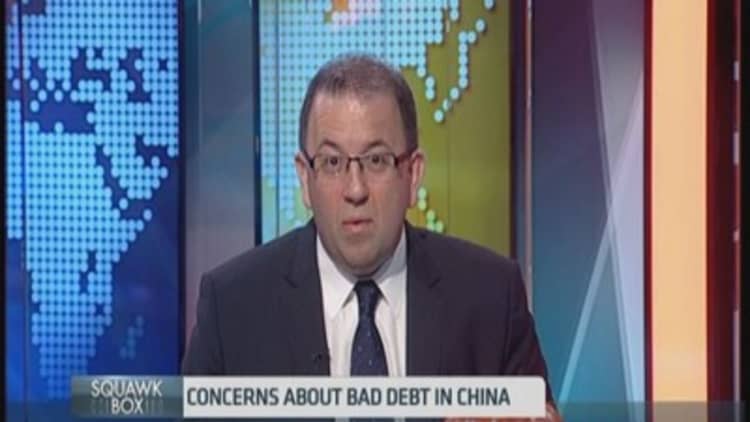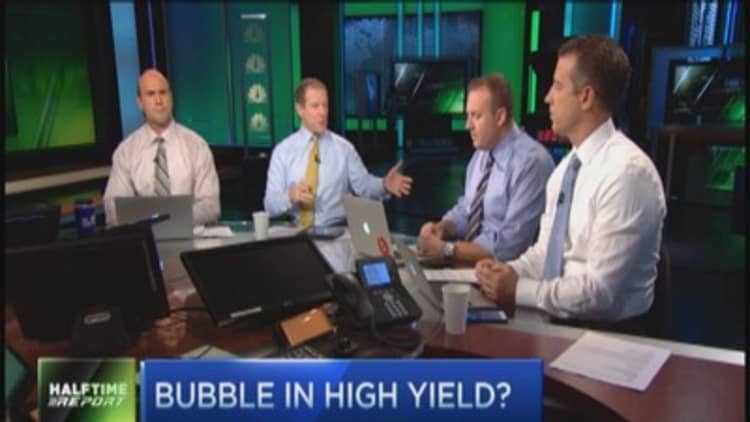
Add a new concern to the stable of high-yield bond risks: ownership of some companies' issuance has become concentrated in the hands of just a few fund managers.
"A reduced number of asset managers hold a significant amount of the debt of large corporate issuers across advanced and emerging market economies," the IMF said in a report issued earlier this month, noting the top-five fund families hold at least 50 percent of reported bond ownership filings by many large non-resource companies in the JPMorgan Corporate Emerging Markets Bond Index.
Read More Has the junk bond bubble deflated?
Some managers hold large chunks of a company's debt, with the report highlighting that Pimco holds more than 20 percent of Ally Financial's total bonds outstanding and around 15 percent of Navient's, while in emerging markets, the top-five hold around 30 percent of Digicel's bond issuance and more than 20 percent of Melco's. Pimco didn't immediately return an emailed request for comment
But while the IMF is concerned about how dependence on just a few funds may affect issuers' access to markets in "times of stress," others believe the risk may be to the fund manager.
"If you own 20 percent of a company's debt -- and that's something we would never do, because we don't think that's prudent -- you're almost duty bound to support the company in its next financing," said Tim Jagger, portfolio manager at Aviva Investors, which has around $371 billion under management. "It's going be very difficult if you're not involved, to think other investors will get involved."
Read More Who's afraid of bond defaults?
Jagger also noted that the concentration of ownership highlights what may be one of the biggest risks in the fixed income market generally: liquidity may suffer as changes in regulations since the Global Financial Crisis mean banks can't warehouse an inventory of bonds like they used to.
Some are not entirely convinced that the ownership concentration with the top-five managers creates a huge risk for high-yield borrowers.
"There are enough other investors that [high-yield issuers] can get deals done," said Gary Herbert, portfolio manager at Brandywine Global, which has around $48 billion in fixed-income assets under management.
While larger deals of $5 billion to $10 billion would likely need broader syndication from big players such as Vanguard or Pimco, "some of these really stressed credits are able to go to hedge funds," he said.
Read More Why the strong dollar may sink junk bonds
"It basically means avoiding restructuring or chapter 11 by paying a modestly higher coupon," he added, noting Puerto Rico took this route.

In March, junk-rated Puerto Rico sold $3.5 billion worth of bonds priced to yield 8.73 percent, with hedge funds buying much of the issuance. Earlier this month, the island also sold a $1.2 billion short-term deal at an almost 8 percent rate to banks. That compares with an around 2.3 percent yield on the benchmark 10-year U.S. Treasury.
The March sale met with strong demand, although many funds quickly took profit, leading to price volatility. The deal earlier this month came with an unusual lockup period for buyers.
"There's always a price. It may not be a price the company wants to pay," Herbert said.
Indeed, Herbert believes the ownership concentration is a greater risk for bond buyers.
Read More Junk bonds aren't junky: Pimco
"Many of the fund managers and managers of ETFs (exchange-traded funds) have gotten so large, they can drive prices [up] to levels where credit should not trade," at least in the new issuance market, Herbert said.
To be sure, Jagger noted that expectations U.S. interest rates won't rise for at least a year are likely to ensure demand for high-yield bonds won't wane.
Read More Don't fight the ECB: Can you still find yield in Europe?
"Until market expectations change over the timing of interest rate rises, investors are going to be attracted to high yielding asset classes," he said. The recent selloff in high-yield has also shaken out a lot of "tourist" money, while longer-term strategic investors have used the improved valuations as a buying opportunity, Jagger said.
It's a shift that may help to protect against a rapid selloff. The IMF has been concerned that the share of the credit market susceptible to a retail selloff has grown, but large institutional investors are less likely to face a "run risk," it said.
—By CNBC.Com's Leslie Shaffer; Follow her on Twitter @LeslieShaffer1


